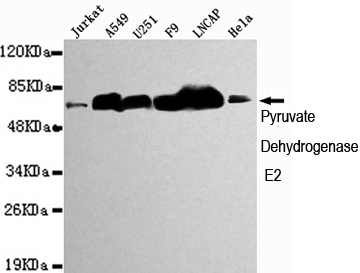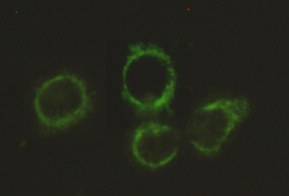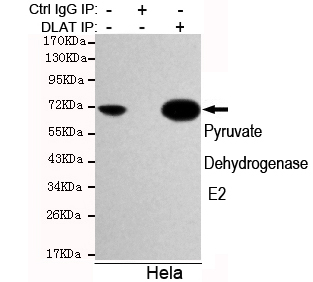-
Product Name
Anti-Pyruvate Dehydrogenase E2 (4A4) Mouse antibody
- Documents
-
Description
Pyruvate Dehydrogenase E2 (4A4) Mouse monoclonal antibody
-
Tested applications
WB, ICC/IF, IP
-
Species reactivity
Human, Mouse
-
Alternative names
70 kDa mitochondrial autoantigen of primary biliary cirrhosis;anti DLAT; Dihydrolipoamide acetyltransferase component of pyruvate dehydrogenase complex; Dihydrolipoamide;Dihydrolipoamide S Acetyltransferase;Dihydrolipoamide S-acetyltransferase (E2 compone antibody
-
Isotype
Mouse IgG1
-
Preparation
Antigen: Purified recombinant human Pyruvate Dehydrogenase E2 protein fragments expressed in E.coli.
-
Clonality
Monoclonal
-
Formulation
Purified mouse monoclonal in buffer containing 0.1M Tris-Glycine (pH 7.4 150 mM NaCl) with 0.02% sodium azide 50% glycerol
-
Storage instructions
Store at 4°C short term. Store at -20°C long term. Avoid freeze / thaw cycle.
-
Applications
WB: 1/1000
;ICC: 1/300
-
Validations

Western blot detection of Pyruvate Dehydrogenase E2 in Jurkat,A549,U251,F9,Lncap and Hela cell lysates using Pyruvate Dehydrogenase E2 mouse mAb (1:1000 diluted).Predicted band size:69KDa.Observed band size:69KDa.

Immunocytochemistry stain of Hela using Pyruvate Dehydrogenase E2 mouse mAb (1:300).

Immunoprecipitation analysis of Hela cell lysates using Pyruvate Dehydrogenase E2 mouse mAb.
-
Background
Swiss-Prot Acc.P10515.This gene encodes component E2 of the multi-enzyme pyruvate dehydrogenase complex (PDC). PDC resides in the inner mitochondrial membrane and catalyzes the conversion of pyruvate to acetyl coenzyme A. The protein product of this gene, dihydrolipoamide acetyltransferase, accepts acetyl groups formed by the oxidative decarboxylation of pyruvate and transfers them to coenzyme A. Dihydrolipoamide acetyltransferase is the antigen for antimitochondrial antibodies. These autoantibodies are present in nearly 95% of patients with the autoimmune liver disease primary biliary cirrhosis (PBC). In PBC, activated T lymphocytes attack and destroy epithelial cells in the bile duct where this protein is abnormally distributed and overexpressed. PBC enventually leads to cirrhosis and liver failure. Mutations in this gene are also a cause of pyruvate dehydrogenase E2 deficiency which causes primary lactic acidosis in infancy and early childhood.
Related Products / Services
Please note: All products are "FOR RESEARCH USE ONLY AND ARE NOT INTENDED FOR DIAGNOSTIC OR THERAPEUTIC USE"
